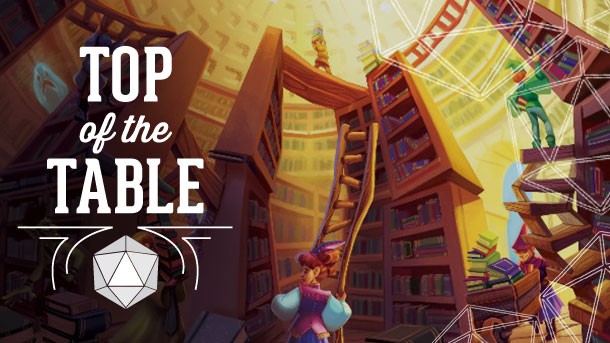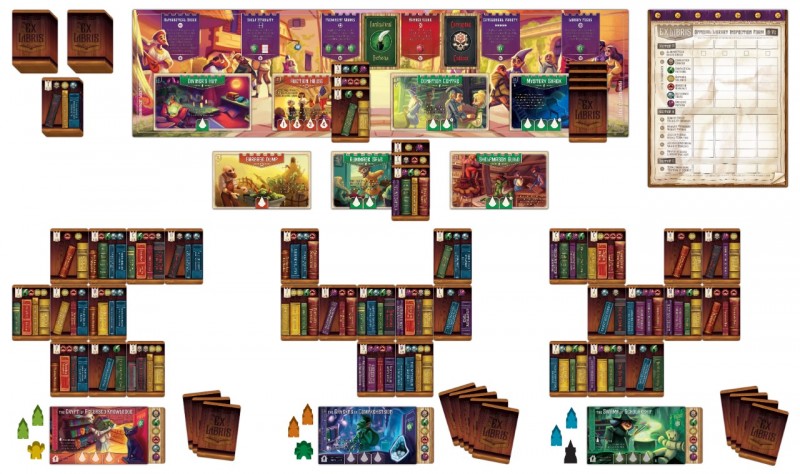Please support Game Informer. Print magazine subscriptions are less than $2 per issue
Top Of The Table – Ex Libris

One of my favorite things about the board-game landscape is its ability to tackle such a broad and eclectic mix of topics, genres, and themes. I’m fascinated by the way that designers, artists, and graphic designers work together to create abstractions of a complex topic, or emulate an unusual set of actions or experiences. Case in point: Ex Libris. In this curious game, players control aspiring librarians in a fantasy town, competing through their growing collection of books to become the grand librarian who holds the finest set of monster manuals, fantastical fictions, corrupted codices, and other strange tomes.
So, yeah. It’s a ridiculous concept, and that’s its greatest charm. Ex Libris is a game about organization and thinking ahead. It’s about loving books, and seeing things put in their proper place. It’s about strange fantasy creatures like gnomes, golems, and gelatinous cubes who serve as your assistants and scour the whimsical magical village in search of new books. And in the mix of all that weirdness, Ex Libris is a game of critical thinking with an array of paths to victory a player must consider.
Strip away the uncommon setting and theme, and Ex Libris employs an intriguing mix of familiar board and card game mechanics, along with some innovative twists. Unique player abilities fuel a worker placement system; the worker placement system supplies cards for gathering card sets; the card sets are played onto the table in a way that demands spatial organization and planning.

Ex Libris features some beautiful and colorful fantasy art on its many cards and tiles
Here’s how that all plays out. Each player controls a unique collector, as represented by a player’s library tile. Everyone gains access to a couple of handy gnome assistants who scurry forth to do your bidding, along with a more powerful assistant with special powers, like a mummy, sasquatch, or fire imp. Each assistant is represented by a wooden meeple figure with its own distinct color and shape (an extra detail that I really appreciate). Over the course of play, assistants are deployed in your own library or across an array of locations in town where books can be gathered in specific ways, with the goal of collecting, shelving, and trading books to further expand your library.
Each card shows a small segment of alphabetized books from several different categories. One category in each game is worth more for everyone, one secret category is worth more to you, and one is inexplicably a banned category of books in town. But none of those books are going to be worth anything unless you get them onto your shelves by playing them onto the table – here you must consider a number of factors; books must be alphabetized, placed on stable shelves (by placing cards into rectangular grids on the table), and with a well-rounded variety of categories, among other considerations. Incorrectly shelved books don’t count toward your score, and you must always keep in mind the way different books will be perceived by the town’s mayor when he evaluates who deserves the title of Grand Librarian.
Ultimately, it’s a lot to keep track of, which is oddly one of the game’s most appealing and, for newcomers, most frustrating aspects of play. There are over a dozen location tiles that might show up in town, and almost as many different player powers to learn and contend against. The numerous paths to victory points at the end can be challenging to keep track of; in your first few games, I’d be surprised if any players would have a clear sense of who was winning or losing part way through the game. In the short term, it means that Ex Libris is best approached with a willingness to explore as a group, and not get too caught up in the minutiae of winning. Instead, enjoy the amusing fantasy art, the impressive array of punny book titles, and accept the gradual learning curve and need for experimentation. With time, the breadth of tactical options is refreshing, as you must keep a lot of balls in the air to find success. There is complexity to uncover in Ex Libris, but it only emerges as all the players at the table begin to grasp the ins and outs of the many interlocking paths to a high score.
Thankfully, Ex Libris also does a good job of helping onboard players so they can grasp the gameplay and scoring. That’s in part thanks to a dedicated scoring sheet (complete with dry-erase marker) that helps everyone at the table see how all the points come together in the end. In addition, Ex Libris offers a handy beginner game variant, in which the player powers are stripped away, and some of the more complicated location tiles are pulled out of play. That variation is my preferred option when playing with younger family members, or even adults who don’t play a lot of board games.

Each player must shelf their books by playing them onto the table; stable placement on the bookcase and alphabetized placement leads to higher scores
Beyond that, the game also offers some other welcome variations. Some of the powers and location tiles can lead to overt conflict with other players, so a “friendlier” mode is offered that strips those tiles out of play. There are also simple rules to extend the game; I personally quite like the one-hour play time of a standard game, but after many sessions, I can also see the appeal of a more extended competition. Finally, while the standard play style allows for 2-4 players, Ex Libris also offers a comprehensive solo mode with its own detailed scoring mechanic. I’m always a supporter of solo play options like this, as they give new game owners a chance to enjoy their game as they learn it, prior to when they introduce it to friends and family.
Designer Adam P. McIver and the team at Renegade Game Studios have put together a deceptively complex and rewarding game in Ex Libris. A charming setting and theme are accompanied by an entertaining mix of mechanics, and a concept that a surprising number of players might only reluctantly admit that they love – a chance to organize something into its perfect order. If your gaming group is ready for a break from tabletop game adventures of epic wars and wild space battles, Ex Libris is a breath of fresh air.
If you can’t quite wrap your head around the idea of a board game night all about being a librarian, then don’t worry. I’ve got you covered with a ton of other recommended games that you can explore at our Top of the Table hub, reachable by clicking on the banner below. I’ve been happy to receive several personalized requests for game recommendations from some of you in recent weeks, and I’d love to hear from more of you; if you’d like help picking out just the right game for your friends and family, drop me a line via email or Twitter.











